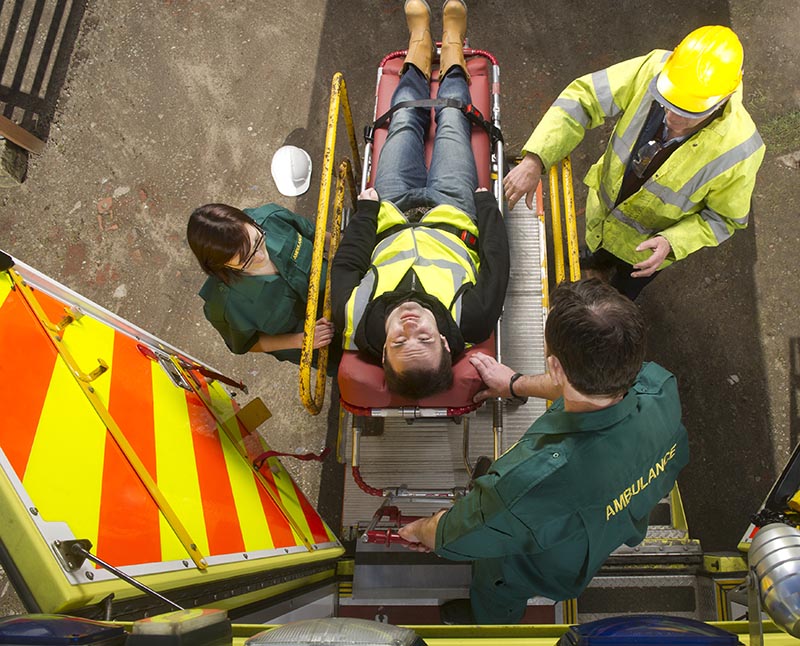
Our goal at Schutz Law is to remove the stress and anxiety of fighting the insurance companies. We will stay in close communication with you throughout your case. Our job is to obtain the maximum recovery on your behalf, while you focus on getting better.

What should I do if I am injured on the job in Illinois?
When workers get injured on the job in Illinois, there are several types of benefits they are eligible to receive. These benefits may cover your medical bills, some of your lost wages if you cannot work, and monetary compensation at the end of your case. Often the employer’s insurance company may provide some part of these benefits, but may not pay for everything you are entitled to receive.
Medical Care
Under Illinois law, employers must pay for reasonable and necessary medical care that was caused by the work accident. Illinois workers are generally entitled to choose where they receive their medical care. If it is an emergency, call 911 and go to the emergency room.
Outside of emergency care, workers may select the medical provider of their choice. They may receive care from that first provider and any subsequent doctor or provider to whom they are referred. Many employees can also have their employer pay for a second opinion. However, your company may have a policy limiting your choices under the Illinois Workers’ Compensation Act. You should never be charged a co-payment, deductible, or balance bill for care related to your work-accident.
It is important to speak to an experienced Illinois workers’ compensation attorney to make sure you understand your options and receive all of the benefits to which you are entitled.
Lost Wages
If your work-related injuries keep you off of work for more than three days, your company may have to pay a portion of your lost income while you are recovering. Most Illinois workers may receive two-thirds (66.66%) of their average weekly wages while their work is medically restricted. Workers who are unable to work for more than two weeks may be entitled to retroactive pay covering the first three days of lost work.
Sometimes your injuries allow you to work with a medical restriction (light duty), but your company cannot pay your full wage because they do not have enough hours to offer or the job pays a lower wage. In that situation, your employer may have to pay you two-thirds of the difference between your new weekly wages and your earnings before the accident occurred. There is no time limit in Illinois for how long you may receive these benefits while you are medically restricted from working.
Permanent Partial Disability Monetary Benefits
Many Illinois workers are entitled to receive a monetary award when their treatment is finished and are released from care by their medical provider. When a worker reaches the end of their medical care and their medical provider determines their condition is stable and permanent, the provider will say they have reached maximum medical improvement (MMI). When this point is reached and the worker suffered a permanent partial disability or they cannot perform some of the activities in the same way as they did prior to the accident, they may be entitled to monetary compensation.
Illinois law provides for different types of awards and benefits depending on the circumstances. For example, many workers receive benefits based upon the nature and extent of their injury to a listed body part.
- If you have permanent work restrictions and can no longer perform your pre-accident job, your company may have to pay for vocational rehabilitation services to help you find a new career and support you financially while you transition to a new job. This may include working with a certified rehabilitation counselor to assist you, resume help, job retraining, education courses, and identifying potential employers.
- When a worker’s restrictions prevent earning the same amount of money made prior to the accident, the company may have to pay the worker a wage-differential benefit to make up some of the difference in their lost earnings until they turn 67-years-old or for five years, whichever is longer.
- When the injury results in serious and permanent disfigurement, the worker may be entitled to receive disfigurement benefits to compensate for their injuries.
- If your permanent condition prevents you from work or you suffer certain amputations, you may be entitled to a permanent total disability benefit payable for the rest of your life.
- When an Illinois worker dies as a result of a work accident, certain family members may receive a death benefit on their behalf as well as burial expenses.
An experienced Illinois workers’ compensation lawyer will aggressively pursue all appropriate benefits to maximize your recovery.
Need Guidance with Workers’ Compensation?
Call our office at 312-606-9080 or complete the following form and we will respond as soon as possible.
